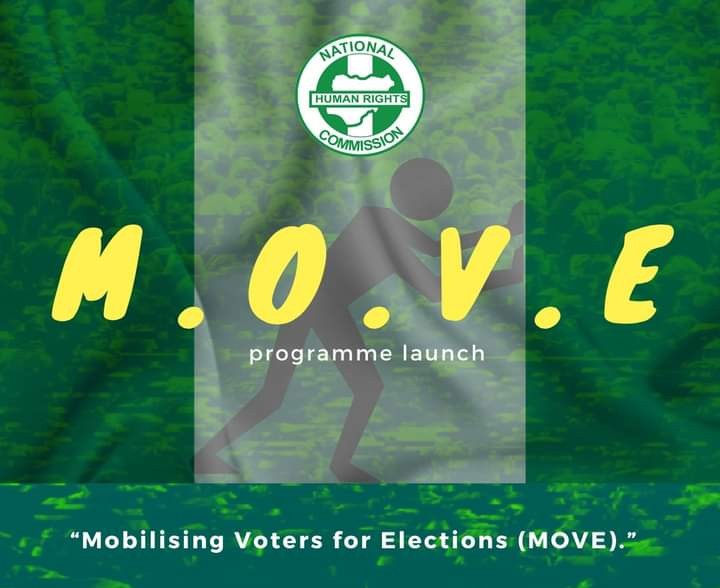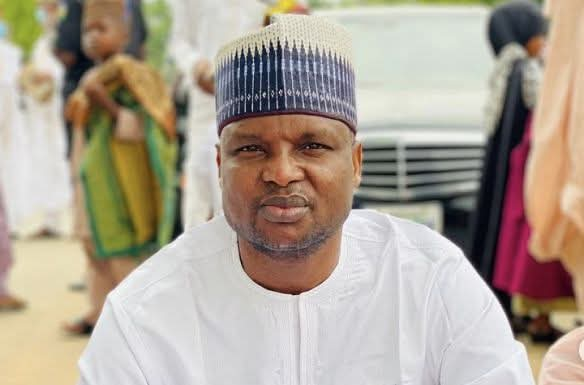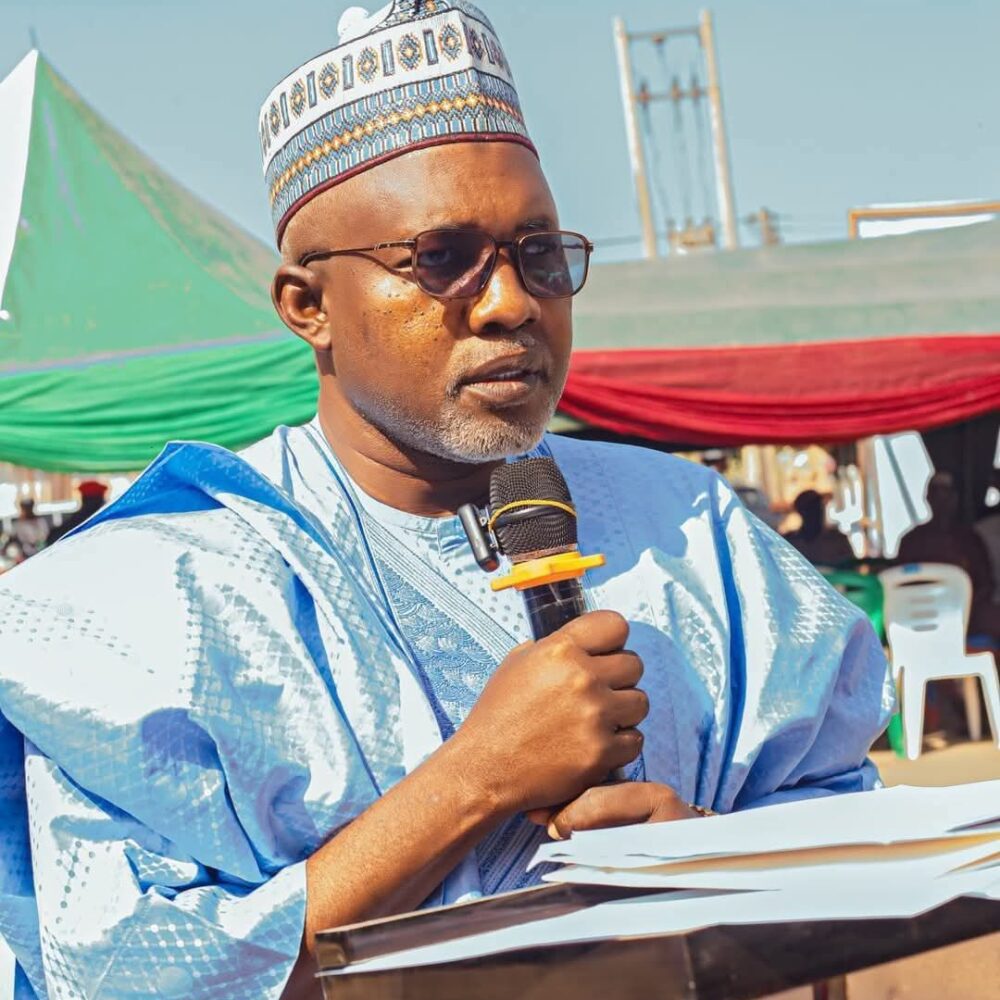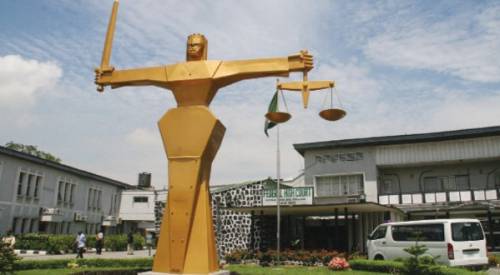The National Human Rights Commission NHRC today Monday 17th October,2022 in line with its constitutional responsibility for the upcoming elections unveiled the “Mobilising Voters for Election (MOVE)” Project.The MOVE is initiated by the NHRC to promote access, participation and accountability in the 2023 general elections in Nigeria.
In his opening speech at program launch in Abuja,the Executive Secretary, National Human Rights Commission NHRC, Barr Tony Ojukwu SAN said the initiative was in line with the commission’s broad mandate to protect, promote and enforce human rights in Nigeria.
He maintained that the Commission deeply invested in the MOVE project with the topics discussed at the media launch, especially in the context of Nigeria’s upcoming general elections, slated for next year.
Ojukwu stated that the Commission was moved to initiate this project due to its concern over the rising voter regression and political apathy that has descended into the political landscape since the 2011 general Elections. Statistics available to the Commission reveal that only around 10% of the voting eligible public participated in the 2021 election in Anambra State. The lack of effective voter participation in Elections robs citizens of their fundamental role in a democracy, which is the freedom to choose their representatives. We believe that this MOVE project will enable the Commission to integrate human rights into democracy and as well ensure citizens’ participation in the upcoming 2023 general elections.
The Project has 4 main objectives:
1. Promoting increased participation of citizens in the voting process through access to permanent voters’ card which will be achieved by conducting high-Level advocacy Outreach to INEC and conducting PVC Collection Campaigns amongst other activities.
2. Mobilizing electorates and creating awareness on the right to vote and its associated human rights which the Commission intends to achieve by Monitoring the Voting process and carrying out a Voter Mobilization Campaign.
3. Building partnerships for the integration of human rights on the agenda of political parties and candidates as a measure to building voter confidence and participation. In a bid to achieve this objective, the Commission will develop a Human Rights Agenda for the 2023 Election, Organize High-Level Forum on Human Rights for Political Parties and Candidates and Establish a National Register for Hate Speech
4. Promoting normative principles and frameworks for human rights oversight of security and law enforcement operations in the elections. The Commission will Develop Guidelines for the Protection of Voters’ Access Principles in Security Operations at Elections and Organize Consultations and Sensitizations for the Nigerian Police Force on the Protection of Voters’ Access Principles at Elections..
He said the MOVE project is expected to increase citizens’ participation in elections and integrate human rights principles into the electoral process to ensure access, increase participation and ensure human rights oversight in law enforcement and security before, during and after the elections.
Also in his speech,NHRC Executive Secretary warned electorates,and politicians against Hate Speech,disseminating of inciting online content before, during and after election.
He pledged that the National Human Rights Commission will fully advocate against the use of hate speech that “otherizes” people but the Commission will not act in support of any effort that seek to place spurious limitations on the right of freedom of expression.
He said “Hate speech is intricately related to human rights, either in its form or outcome. From the purveyor, it is about right to freedom of expression, opinion, speech or belief. To the recipient, it is a violation of the rights to dignity of human person and the freedom from discrimination based on religious belief, political, ethnic, gender, cultural or other affiliations, amongst many other human rights.
“It is based on the above that I would like to situate our discussions today, especially for us to understand the human rights dimensions of hate speech.
“The United Nations Strategy and Plan of Action on Hate Speech defines hate speech as… “any kind of communication in speech, writing or behaviour, that attacks or uses pejorative or discriminatory language with reference to a person or a group on the basis of who they are, in other words, based on their religion, ethnicity, nationality, race, colour, descent, gender or other identity factor.”
“From the definition, one can deduce that a key characteristic of Hate speech is that it can be conveyed through any form of expression including images, cartoons, memes, objects, gestures and symbols and it can be disseminated offline or online.
Also, hate speech is “discriminatory” – biased, bigoted, intolerant – or “pejorative” – in other words, prejudiced, contemptuous or demeaning – of an individual or group.
“Hate speech makes reference to real, purported or imputed “identity factors” of an individual or a group in a broad sense: “religion, ethnicity, nationality, race, colour, descent, gender,” but also any other characteristics conveying identity, such as language, economic or social origin, disability, health status, or sexual orientation, among many others.
“It is important to distinguish between hate speech and the exercise of the right to freedom of speech. There are those who point to valid criticisms of them, their positions or lifestyle and refer to those criticisms as a form of hate speech. Also, political actors usually term criticism of some government actions or inactions as hate speech.
“It is important to balance the fight against hate speech in its various forms and the constitutionally guaranteed right to Freedom of Expression. The true test of the existence of the protection of The Freedom of expression or right to free speech as it is called in some societies is the ability of people in that society to voice seemingly controversial opinions. On the other hand, opinions which violate peoples right to dignity, incites violence on others based on difference of religious, political or cultural positions will be classified as hate speech.
“The onus is on those who seek to police speech, especially on social media to walk this fine line and strike the right balance in order to ensure that human rights are not further violated, whilst fighting hate speech.
“I want to draw a connecting line between hate speech as we have defined it and the forthcoming elections. A common feature of election season is to hear all sorts of charged and sometimes hateful and inciteful rhetoric from the various political sides and their supporters against one another. This scenario has become a regular occurrence in Nigeria where politics tends to be very sectional.
There are those who will willingly pull at Nigeria’s traditional fault lines of religion and tribe in order to advance their own selfish interests. Politicians and their supporters must adopt a responsible way to canvass for votes and energize their supporters.
“Violent attacks that threaten the lives and property of people have been traced to inciteful and hateful remarks. A commonly cited example of this is what happened in Rwanda.
“In the Nigerian electoral context, saying a person who hails from a certain tribal group cannot be a leader because of a perceived perception about people who hail from that tribe can be interpreted to meet this definition of hate speech.
The NHRC Boss however said that the commission will establish a National Hate Speech Register which will monitor and track hate speeches from all platforms across Nigeria and deploy its enforcement mandate on perpetrators.
” The Commission will be working with Facebook, Twitter and other platforms to fully establish a monitoring mechanism to achieve this objective”.He maintained.
He then highlighted the role of the citizen in relation to the issues that related the forthcoming election s.
” Your power as a Citizen is a huge responsibility that must be exercised soberly. Engage in the political process while respecting the fact that the Political space is filled with plurality of ideas.
“You’re more likely to convince someone to see things your way and possibly cast a vote for your favoured candidate when you respectfully try to persuade them rather than when you insult them or cast aspersions on their faith or ethnicity. As we engage in the political process, we must do so with the utmost respect for those who do not necessarily agree with us”.He added.
The highlight of the event was the presentation of objectives of the MOVE project by the Project Coordinator,Mr Hillary Ogbona.
The were goodwill messages from development partners and other stakeholders.
The National Human Rights Commission was established by the National Human Rights Commission Act 1995 as amended.The Commission was formed in fulfilment of Nigeria’s International obligations under Resolution 48/134 of the United Nations General Assembly 1993 requesting member states to establish Independent National Human Rights institutions for the promotion and protection of human rights in their domain.
The National Human Rights Commission has the mandate to promote and protect human rights of every person in Nigeria in line with the human rights provisions under the constitution, enactments of the National and State Assemblies and treaties and conventions acceded to by Nigeria.





